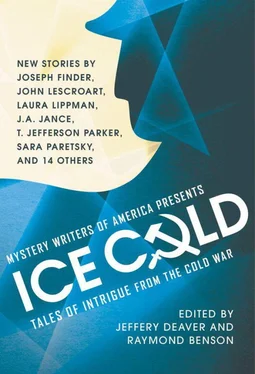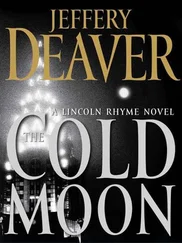“I,” her mother said, “had four sons. No one could clean more than I did.”
“I cook a lot, too. I’m getting pretty good.” Judith was proud of her cooking, the meals she put together for Patrick. She would never be like the woman in the Alka-Seltzer commercial, the one who made heart-shaped meatloaf. “Sometimes I wonder if I should have kept my job until I got pregnant.”
A quick laugh at her own expense, as if what she was saying was silly. But she did miss work, the intrigues of an office, being around others. She had lived at home until she married. She had wanted to take an apartment with another girl after she finished college, but her parents wouldn’t hear of it.
“Marry in haste, repent in leisure.”
Judith adjusted the phone, which she had cradled between her ear and shoulder, thinking she must have misheard. For one thing, no one could call Patrick Monaghan’s courtship hasty.
“I didn’t catch that,” she said. “I’m washing the breakfast dishes.” Patrick liked to start the day with eggs, bacon, toast, and juice. She had made the juice fresh until he told her he preferred Minute Maid concentrate. That was okay, she used the empty cartons to set her hair after he left in the mornings, the best way to get the smooth look that he liked.
“Mrs. Levitan died that way. She was washing the dishes and the phone slipped in the sink and she was electrocuted.”
“I don’t think that’s what happened,” Judith ventured.
“You’re right. Mrs. Levitan is the one who died while talking on the phone in a thunderstorm. It was Irene Sandowski who dropped the phone. Although I think it was in the bathtub.”
“Oh, Mother, how could someone drop the phone in the bathtub? The Sandowskis aren’t the type of people to have a phone in the bathroom.”
“She thought she was so clever, that one. And grand. She had her husband find an extra-long cord—I think he had to call Bell Atlantic special—and she hooked it up to a princess phone, pink, a birthday gift, and she would take it into the bathroom and prop it up on the toilet and take bubble baths like she was Doris Day or somebody, talking the whole while. Well, one day, the whole thing fell in.” A pause. “I just realized—I never did understand why she got a pink phone, when her bedroom was all gold and white, but the bathroom was pink.”
“Irene Sandowski is alive,” Judith said.
“Are you sure?”
“She was alive as of last week when I got the invitation to Betty’s wedding. Irving and Irene Sandowski request your pleasure, et cetera, et cetera.”
“I didn’t say she died . But that’s why she has that white streak in her hair and now she has to be careful when she gets her teeth cleaned because her heartbeat is irregular. So Betty is getting married? Someone nice, I hope.”
Nice meant Jewish . Nice meant rich , or at someone who might be rich, some day. It also meant: Not like your husband, the Irishman, the Mick, who took you to the far side of town, where I suspect you are eating HAM every day. Yet the Weinsteins didn’t keep kosher and ate pork when they had Chinese carry-out, while crabs were okay as long as they were eaten outside on newspaper. However, her mother had never tasted lobster, a fact of which she was strangely proud.
“It’s nice over here,” Judith said. Sometimes, saying a thing could make it true. It wasn’t not nice. It just wasn’t where she had expected to live.
“It’s tacky, sharing a wall with another house,” her mother said.
“You grew up in a rowhouse.”
“ You didn’t,” her mother said. “I’ll talk to you tomorrow.”
“You don’t have to call every—” but her mother had already hung up.
Judith thought maybe she should spend less time talking to her mother and more time with her brother, Donald, the one closest to her in age. A bachelor who worked for a state senator, Donald was used to listening to people. Plus, he liked Patrick, had helped get him the job with the liquor board. Donald had lots of connections, lots of pull.
“Maybe you should get a job, Judith,” Donald said. “I can help you if that’s what you want.”
“Oh, no,” she protested. “I’m a married woman now. And the babies will start coming any day. I’d just end up quitting.”
Those wished-for babies were the reason for the house on Newfield Road, which Patrick had rented without consulting her. “With three bedrooms, a yard, and a washing machine—no dryer, but it has one of those umbrella like things to hang the clothes on and the yard gets good sunlight, I made sure to check that. And a garbage disposal, Judith. Plus an unfinished basement, which we could make into a rec room, the landlord said improvements were fine. Of course, we probably won’t be there long enough to care. I mean, it’s okay for one kid, but once we get past that—”
Patrick had never said so many words at one time in all the time Judith had known him.
“Newfield Road? I don’t even know where that is,” she had said.
“Edmondson Heights. Over by Social Security, but closer to Route 40. You know Mr. G’s, where I used to take you for soft ice cream when we started dating? And the drive-in where we saw that movie together the night we met? Sort of between those two places.”
Judith had fond memories of both Mr. G’s and the drive-in. But Judith had considered those exotic adventures, akin to going on an African safari. Observe the Baltimore Irish Catholic in his natural environment, eating soft ice cream and onion rings after a movie. The boys Judith knew congregated at diners, after dropping their dates at home. Edmondson Heights was seven exits away on the Beltway from where she grew up in Pikesville. It might as well have been seven hundred miles.
“I don’t know people who live over there.”
“You’ll meet some. I have lots of cousins in the neighborhood, if it comes to that.”
“I mean, I mean”—But she could not say: I don’t mean people, people. I mean my people. Your people are not my people. How could she point out that there wasn’t a single temple along the Route 40 corridor? Patrick thought she wasn’t going to go to synagogue any more. They had thrown in their lot together, Romeo and Juliet, vowing to disown their disapproving families and live their own lives, by their rules. Only it turned out their families would not be disowned so easily and what were supposed to be their rules, Patrick’s and Judith’s, were turning out to be Patrick’s rules. He chose where they lived. He chose how they spent their weekend hours. She suspected, come December, he would choose to have a tree in the living room. At which point, should Judith’s mother visit, she would drop dead on the spot.
But, so far, her mother had inspected the rowhouse only once. She had walked through it without comment, unless sniffs could be counted as comments. In which case, she had made roughly forty, fifty comments, five to ten per room. The thing that seemed to bother her the most was the umbrella-like drying line in the backyard that Patrick considered such an asset. She had placed a hand over her heart and shook ever head ever so slightly, the way she did when she watched the war coverage on TV.
Certainly, her mother could not be surprised that Judith didn’t have an automatic dryer, and she had to admit the washer in the duplex was a step up from the coin-operated machines in the Bonnie Brae Apartments. Louise Weinstein, as a newlywed, had pinned clothes to a line strung behind a Butchers Hill rowhouse, not that far from where the Monaghans lived in Fell’s Point. Both families had moved up and out, of course, but the Weinsteins had headed northwest, while the Monaghans marched due west. Judith and Patrick might never have met if they hadn’t ended up on a double date together, and it wasn’t even with each other. Judith’s date, Harold, asked to find a boy for her friend Thelma, had suggested Patrick Monaghan, an enthusiastic volunteer in the governor’s race. Thelma was a pretty girl, but Judith could feel Patrick’s eyes on her neck throughout the entire film, Sweet Charity . The next day, Patrick called and asked if she was really as interested in politics as she had claimed over soft ice cream at Mr. G’s because the Stonewall Democratic Club was always looking for volunteers. Oh, she was interested . She was interested in politics and interested in this stoic Irish redhead. Go figure—the man was trustworthy, but politics broke her heart. Patrick’s, too, if it came to that. They never quite got over what happened in that governor’s race. The Watergate hearings, as far as Judith was concerned, were just an opportunity for the rest of the nation to learn what they already knew. It was all a shuck, a game, business as usual. Patrick and Judith had presented their youth and idealism like a burnt offering to pagan gods, then comforted each other when it came to naught. At least they had a marriage to show for it. Lots of young couples were marrying early if only because of the lottery numbers the boys had been assigned. But Patrick had a high number. Judith knew he really loved her.
Читать дальше












